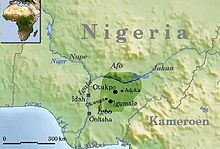Idoma
The Idoma are a Middle Nigerian people who have 300,000 members.
They speak Idoma , an idomoid language . Its neighboring peoples are the Idibio , the Igbo , the Mama and the Mumuye .
art
The Idoma art in western collections consists primarily of wooden masks, which are used for funerals and social control , and human-like wooden figures that are often quite large.
history
Linguistic evidence shows that the Idoma have lived in their present region for at least four to five thousand years and that their ancestors may have migrated to the area from the north with those of the Yoruba , Bini, and Igbo . All of these peoples belong to the Kwa language family . Linguists are able to use the differences between languages to estimate the time since they began to drift apart. They split from the larger ethnic groups in the area at one point and began to build their own culture in relative isolation.
economy
Most of the Idoma are farmers. Their main products are yams and taro , locally called "cocoa yams". Autumn is the time of great celebration. Yams are produced efficiently enough to be exported to the neighbors. They also harvest the fruits of the oil palm, which are processed into oil and exported in large quantities to Europe, making it a fairly profitable money crop . Other important crops are corn , cassava , peppers , peanuts, pumpkins, and sweet potatoes . Goats, sheep, chickens and dogs are kept by almost everyone. Although hunting no longer makes a significant contribution to the local economy, fishing is still very important across the region.
Political system
The Idoma live in densely populated villages or on relatively scattered farms. Political traits exist primarily at the community level with the position of the tribal leader, whose position is patrilineally inherited. His succession under the Idoma often alternates between two patrilineal structures, thereby weakening the power of the leader to some extent. The leader usually consults a council of elders before making important decisions. In the past, age-grade societies and the associated masking traditions contributed to social control.
religion
The Idoma religion focuses on honoring one's ancestors. Funeral ceremonies among the Idoma are often quite dramatic, the combination of age and prestige determines the attention that is given to the member. Large burials are made for both men and women to send them on their final journey from their village to the spiritual world across the river. A memorial service or a second burial is held for the dead shortly after the actual burial to ensure that the deceased has made it into the ancestral world.
Web links
- Idoma Information (English)

